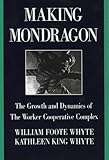Making Mondragón : The Growth and Dynamics of the Worker Cooperative Complex / Kathleen King Whyte, William Foote Whyte.
Material type: TextSeries: Cornell International Industrial and Labor Relations Reports ; 14Publisher: Ithaca, NY : Cornell University Press, [2014]Copyright date: ©2014Edition: Second EditionDescription: 1 online resource (350 p.) : 1 map, 2 graphs, 6 tables, 2 figuresContent type:
TextSeries: Cornell International Industrial and Labor Relations Reports ; 14Publisher: Ithaca, NY : Cornell University Press, [2014]Copyright date: ©2014Edition: Second EditionDescription: 1 online resource (350 p.) : 1 map, 2 graphs, 6 tables, 2 figuresContent type: - 9780801471735
- Producer cooperatives -- Spain -- Mondragón
- Europe
- Labor History
- Sociology & Social Science
- POLITICAL SCIENCE / Labor & Industrial Relations
- Administrative Science
- American social science
- Contemporary Sociology
- Mondragón Corporation
- Organization Studies
- Organizational Development european
- Spanish cooperative
- community economic development
- cooperative employee ownership
- cooperative enterprise
- employee-owned firms
- european politics
- european worker relations
- evolution of the Mondragón cooperatives
- how to create a worker cooperative
- interest in worker cooperatives
- international cooperative movement
- labor relations case studies
- labor relations
- organizational Sociology
- organizational practice
- organizational sociologists
- organizational theorists
- qualitative methodologists of American social science
- qualitative methodologists
- social anthropology of advanced organizations
- social scientists of administration
- spanish business practices
- spanish worker relations
- work redesign programs
- worker cooperative
- worker cooperatives
- 334/.6/094661
- HD3218.M66 W48 1991eb
- online - DeGruyter
| Item type | Current library | Call number | URL | Status | Notes | Barcode | |
|---|---|---|---|---|---|---|---|
 eBook
eBook
|
Biblioteca "Angelicum" Pont. Univ. S.Tommaso d'Aquino Nuvola online | online - DeGruyter (Browse shelf(Opens below)) | Online access | Not for loan (Accesso limitato) | Accesso per gli utenti autorizzati / Access for authorized users | (dgr)9780801471735 |
Frontmatter -- Contents -- Tables and Figures -- Preface -- Part One. Mondragόn in Context -- 1. The Importance of Mondragόn -- 2. The Basques -- Part Two. Building the Cooperative Complex -- 3. The Foundation -- 4. The First Worker Cooperatives -- 5. Supporting Organizations and Diversification -- 6. Cooperative Groups -- 7. Applied Industrial Research -- 8. The Central Role of the Cooperative Bank -- Part Three. Managing Change -- 9. Coping with Internal Conflict -- 10. Rethinking the Systems of Participation -- 11. Changing the Organization of Work -- Part Four. Coping with the Worldwide Recession -- 12. Sacrificing for Collective Survival -- 13. Providing for Unemployment Compensation and Support -- 14. From ULARCO to FAGOR -- 15. Expanding Service and Agribusiness Cooperatives -- 16. The Changing Role of the Caja Laboral Popular -- Part Five. Restructuring for the 1990s and Beyond -- 17. Strategic Organizational Restructuring -- 18. Facing the Social Challenges of Intensified Competition -- Part Six. Lessons from Mondragόn -- 19. Uriderstanding Mondragόn’s Founder -- 20. Ethnic and Organizational Cultures -- 21. Implications of the Mondragόn Experience -- Appendix. Evolution of Our Research on Mondragόn -- Bibliography -- Index -- About the Authors
restricted access online access with authorization star
http://purl.org/coar/access_right/c_16ec
Since its founding in 1956 in Spain's Basque region, the Mondragón Corporation has been a touchstone for the international cooperative movement. Its nearly three hundred companies and organizations span areas from finance to education. In its industrial sector Mondragón has had a rich experience over many years in manufacturing products as varied as furniture, kitchen equipment, machine tools, and electronic components and in printing, shipbuilding, and metal smelting.Making Mondragón is a groundbreaking look at the history of worker ownership in the Spanish cooperative. First published in 1988, it remains the best source for those looking to glean a rich body of ideas for potential adaptation and implementation elsewhere from Mondragón's long and varied experience. This second edition, published in 1991, takes into account the major structural and strategic changes that were being implemented in 1990 to allow the enterprise to compete successfully in the European common market.Mondragón has created social inventions and developed social structures and social processes that have enabled it to overcome some of the major obstacles faced by other worker cooperatives in the past. William Foote Whyte and Kathleen King Whyte describe the creation and evolution of the Mondragón cooperatives, how they have changed through decades of experience, and how they have struggled to maintain a balance between their social commitments and economic realities. The lessons of Mondragón apply most clearly to worker cooperatives and other employee-owned firms, but also extend to regional development and stimulating and supporting entrepreneurship, whatever the form of ownership.
Mode of access: Internet via World Wide Web.
In English.
Description based on online resource; title from PDF title page (publisher's Web site, viewed 26. Apr 2024)


